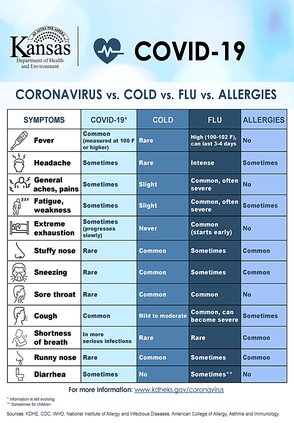Sniffles, coughs and sneezes.
This was already a confusing time of year medically, before the onset of COVID-19. It is the tale end of the winter cold and flu season, and it is the beginning spring allergy season.
Adding to this jumble is the fact that these maladies share some common symptoms, said Steve Stites, MD, chief medical officer for The University of Kansas Health System, We just have to listen to what our bodies are telling us and practice good, ol’ common sense.
“When it comes to the novel coronavirus, using our common sense is the most powerful tool that we have,” Stites said. “It tells us to listen to the medical experts and heed their advice. It means we should stay at home and stay safe. Wash our hands often and use hand sanitizer in between. Keep your hands away from your face as that is one of the fastest ways to spread the virus. Get plenty of rest, eat right, and drink plenty of water.”
This won’t last forever, and common sense tells us the sooner we maintain social distance with one another, the sooner this virus will have no where to go and we all can return to work and our more normal routines, he said.
Should I see a doctor?
Meanwhile, there is a lot in the air and it can be difficult to know when to seek medical care.
“Flu season is winding down while allergies are beginning,” Stites said. “There is no fever with seasonal allergies. High fever, shortness of breath, cough and diarrhea are more common with COVID-19.”
But, still it could be a challenge for someone to know what is wrong with them and if they should seek medical attention.
“There are signs your body will show that indicate when to contact your primary care physician or call 9-1-1,” Stites said. “If you have symptoms of shortness of breath when going about your daily activities such as making yourself something to eat or going to the bathroom, that is a serious sign you should contact your doctor or go the emergency room.”
And. “if you’re having chest pain that is not associated with a cough, that potentially could be a heart attack or sign you have pneumonia from novel coronavirus,” he said. That should also prompt one to consider the emergency department and call ahead.
“If you have altered mental status or confusion or slurred speech, those are warning signs you may need emergency help,” he said. If someone has a runny nose or cough and no severe symptoms, it doesn’t mean they’re clear of coronavirus, and they should call their physician or health department and get advice.
“Eighty percent of patients who contract novel coronavirus can recover at home with rest, plenty of fluids and a fever reducer,” Stites said.
Listen to your body
The doctor said it is always important now to know your body and understand what might be changing.
“It is always important to know your body and take note of what is normal,” he said. “To stay healthy, eat well focusing on good nutrition, exercise, get plenty of rest and stay at home to minimize your risk for catching novel coronavirus.”
It is also important to be your own health advocate.
“The best way to advocate for yourself during this public health crisis is to shelter at home, eat right, rest and exercise,” he said. Know your body. If you have a fever 100.4 or higher, coughing, loss of smell and taste or experience any of the symptoms described above, keep calm and call your doctor.
Don’t panic
From hording toilet paper to seeking questionable and scam cures, there is a lot of panic when it comes to health now. “It is normal to feel anxiety during these trying times,” Stites said.
“It is healthy to acknowledge your feelings because the more you resist, the more it persists,” he said. News of the novel coronavirus is everywhere, and it can be daunting.
“Consider catching up on the news once or twice a day,” he said. Listen to the experts and follow their advice to keep safe.
“Now is a good time to shift your focus from what you can’t do to and find joy in spending time with family,” he said. “Be calm and confident around children in the home to keep their anxiety low. And, take a deep breath. There is scientific evidence that taking a deep breath helps reduce anxiety.”




